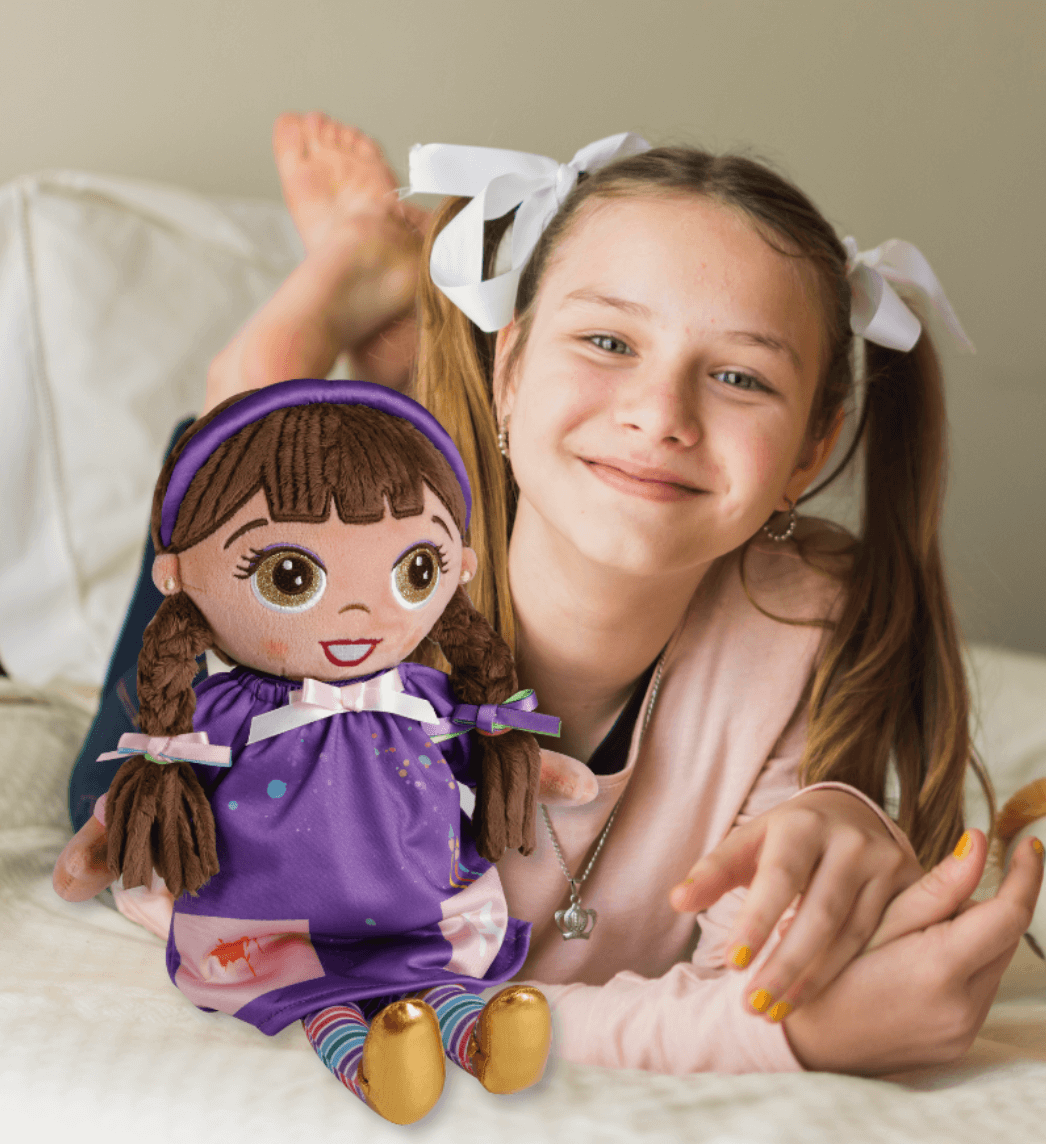Playing is learning! The importance of play in early childhood education cannot be underestimated because learning through play is essential to a child’s growth. It stimulates early brain development, improves intelligence, sparks creative thinking and improves communication, vocabulary and language while promoting better physical and mental health.
For centuries, playing with dolls has remained an integral aspect of human child development. Across various civilisations, it is a profound cultural aspect that symbolises cultural rituals, religious practices, and societal roles.
Doll play refers to the imaginative and interactive activities children engage in with their dolls, using them as tools for self-expression, creativity, and social interaction. Dolls encourage them to create their own imaginary worlds, as opposed to problem-solving or building games. They encourage children to think about other people and how they might interact with each other.
But have you ever wondered about the impact of this simple yet timeless activity on your ward’s health? Beyond mere entertainment, playing with dolls has far-reaching effects on your child’s cognitive, emotional, social, and physical development. Let’s unfold these positive aspects of doll playing and understand how this simple act of fun can be beneficial in laying a solid foundation for a child who is healthy and well-developed.
Cognitive Development
Cognitive development means how children think, explore and figure things out. It is the development of knowledge, skills, problem-solving and dispositions that help children think about and understand the world around them. Doll playing fosters your child’s cognitive development by letting them create a scenario of their own choice and solve the problems on their own.
- Encouraging Creativity and Storytelling:
Doll play fosters your child’s vivid imagination. Through role-playing with dolls, children create intricate narratives, explore different scenarios, and develop their storytelling abilities. This imaginative exercise enhances their creative thinking and fosters a love for storytelling.
-
Enhancing Problem-Solving Skills:
Doll play involves navigating various situations and conflicts, prompting children to think critically and enhance their problem-solving ability. Whether deciding on a doll’s outfit, resolving conflicts in a play scenario, or creating a narrative, children engage in problem-solving exercises that contribute to developing analytical thinking and decision-making skills.
-
Empathy and Understanding Emotions:
Playing with dolls helps children to explore and understand emotions. Children develop strong empathy for others as they feel different emotional states within their play scenarios. This emotional engagement contributes to a deeper understanding of human emotions and encourages compassionate responses in real-life situations.
-
Developing Communication Skills:
Doll play liberates a freedom to express their thoughts, feelings, and desires through interactions with their dolls. This practice helps hone verbal and non-verbal communication skills. Children learn to articulate their ideas, negotiate with imaginary characters, and express themselves effectively, laying a foundation for strong communication abilities in social settings
ii. Social Skills
Playing is crucial in enhancing social development in children. Doll playing can help children develop their social skills. By listening, paying attention and sharing play experiences, children can explore their experiences and develop self-discipline.
-
Encourages Sharing and Collaboration:
Doll play encourages cooperative behaviours, such as sharing dolls and accessories. Children get engaged in imaginative scenarios where they take turns and share resources. This early exposure to cooperation sets the stage for positive social interactions and fosters a sense of teamwork.
-
Creating Bonds Through Shared Play Experiences:
As a shared activity, doll play brings children together. The collaborative nature of playing with dolls helps build bonds between siblings, friends, or peers. Shared play experiences create lasting memories and strengthen relationships, fostering a sense of friendship and connection.
-
Learning Social Norms and Etiquette:
Doll play provides a structured context for children to learn and practice social norms and etiquette. We have often noticed children mimicking the real world while playing with dolls. Doing so teaches them appropriate behaviours, manners, and communication styles. This early exposure to social conventions contributes to developing socially adept individuals who easily navigate interpersonal relationships.
iii. Emotional Well-being
-
Providing a Sense of Security:
Dolls often become cherished companions for children, offering a sense of security and comfort. The presence of a familiar doll can act as a source of reassurance, especially in new or unfamiliar environments. This companionship is constant in a child’s world, fostering emotional stability and safety.
-
Reducing Feelings of Loneliness:
Dolls can be powerful antidotes to loneliness. The interactive nature of doll play creates a supportive environment where children can engage in imaginative dialogues, reducing the impact of loneliness on their emotional well-being.
-
Self-Expression and identity:
Doll play is a creative outlet for children to express their thoughts, emotions, and experiences. Kids also create fictional stories, participate in role-playing, and experiment with various aspects of their personality. This form of expression is crucial for emotional development, enabling children to process and communicate their feelings in a safe and constructive manner.
IV. Motor Skills Development
When little children unbutton the raincoat of their favourite doll or brush their hair to untangle, they improve motor development.
-
Fine Motor Skills
Doll play often involves dressing and undressing dolls, requiring precise hand-eye coordination and fine motor skills. Fine motor skills involve small muscles working with the brain and nervous system to control movements in the hands, fingers, lips, tongue and eyes. Developing fine motor skills helps children eat, write, manipulate objects and get dressed.
-
Gross Motor Skills
Moving larger objects within the play environment helps children enhance their coordination, balance, and spatial awareness. Doll play often involves setting up and rearranging dollhouses or furniture, requiring gross motor skills. These activities lay the foundation for physical tasks that involve larger muscle groups. Moreover, running, jumping, and enacting various movements during play enhance a child’s coordination and motor control, fostering healthy physical activity and development.
V. Educational Opportunities
Dolls can be your child’s first educational toy. Children intimate artificial scenarios with their dolls. Doll play becomes an interactive platform for learning basic academic concepts. Children can engage in alphabet and counting games with their dolls, turning what might seem like rote learning into an enjoyable and memorable experience. Moreover, if your child is interested in a particular side of education, like math, a STEAM Maalika mathematician doll can be your child’s best companion. Or if your child is much more interested in science, Silla the scientist doll will be their first-ever superhero.
VI. Parental Involvement
Doll play also creates a special bond between kids and parents. Parental involvement in doll play creates a special bond between caregivers and children. By actively participating in imaginative scenarios, parents share the joy of play and strengthen the parent-child relationship.
Parents also play a crucial role in creating a supportive environment for doll play. Providing the necessary resources, such as cute little STEAM dolls and accessories, encourages children to explore their creativity. Additionally, offering praise and encouragement fosters a positive attitude towards play, enhancing the overall experience for the child and reinforcing the importance of parental support in their development.
VII. Conclusion
Children grow and develop rapidly in their first five years across the four main areas of development. These areas are motor (physical), language and communication, cognitive and social/emotional. Doll play is incredibly valuable and beneficial for children in their early childhood years. These benefits include refined Cognitive and motor development, emotional well-being of children and effective learning of social behaviour. All these benefits play a pivotal role in developing a healthy child.
It’s crucial to remember that doll playing helps make children creative and productive without being bound to gender. It encourages sharing and collaboration, enhances problem-solving and communication skills, and develops a strong bond between parents and children. In conclusion, parents, guardians, and educators should support and encourage children’s doll play activities.





